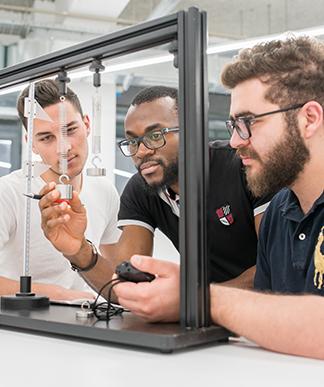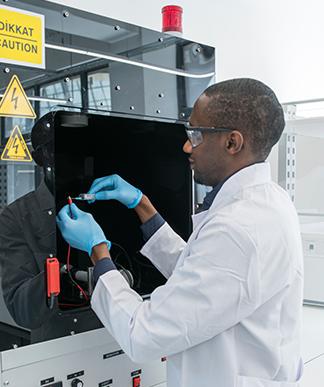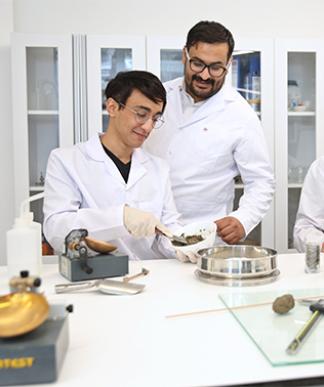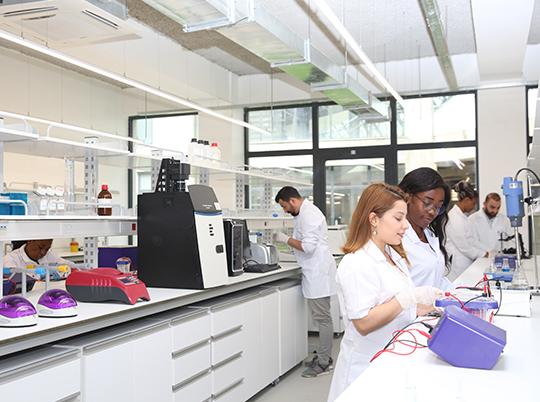


About the Program
Bioengineering has developed in the last thirty-five years as a result of the rapid progress in molecular biology, biochemistry, microbiology, cell metabolism, basic engineering, and materials science. It has emerged as a new branch of science, used where biological techniques and engineering principles are applied to living systems and their problems. Bioengineers have a major role in biological innovations from decoding the source of life to synthesizing cells. Graduates of this program earn the title of bioengineers.
The Bioengineering Undergraduate Program aims to develop new technologies by using biological systems and processes. Students need to grasp the guiding principles of engineering and learn to examine biological mechanisms and facts from an engineers’ perspective, which they gain through internships. By following the postgraduate course assigned to each student in their fourth year, our students are able to reinforce their knowledge and take part in research, where they will be able to find solutions to current problems.
Education Opportunities
The Bioengineering Undergraduate Program aims to develop new technologies by benefiting from biological systems and processes. Throughout the four years of study, an association is created between major and applied sciences, by students taking major science courses such as physics, chemistry, biology, mathematics, materials science and major engineering courses such as thermodynamics, heat and mass transfer, fluid mechanics, genetics, molecular biology, metabolism, cell physiology and biochemistry, bioprocess engineering, neurobiology, and immunology.
Most of the courses which form the four-year-curriculum have both tutorial hours and laboratory practices. At the end of the second and third years of education, students have mandatory summer training, getting the chance to put theoretical knowledge into practice.

Career Areas
Some of the careers available to the graduates of the program Bioengineering include genetic analysis, cytological biological toxicity tests, biological production processes, suitable reactor and separation/purification equipment selection and design, development and production of biological material testing, and production of diagnostic kits. People who complete the Bioengineering Undergraduate Program will be able to enjoy job opportunities in a wide range of industrial sectors including the pharmaceutical sector and the environment sector, in hospitals and clinics, and institutions with legal obligations, such as Hifsi Sihha and the TSE. Careers are also possible in the areas of genetic diagnosis and treatment centers, vaccine production facilities, military institutions, research and development departments of different food product and beverage companies, as well as factories producing energy sources, drugs, biochemical materials like enzymes and biopolymers for the production of biologically compatible products. The significance of bioengineers has been increasing recently, allowing us to talk about countries’ bio-economies as well.
Contact
Faculty of Engineering
Science and Technology Center, ST 226
Tel: +90 392 671 1111 Extension: 2401
Faculty E-mail: secretary-fe@ciu.edu.tr
Head of Department: Assoc. Prof. Dr. Nahit RIZANER
Head of Department E-mail: nrizaner@ciu.edu.tr
Compulsory Courses
First Semester
INTRODUCTION TO BIOENGNEERING
Course code
BIOE100Credit
0Theoretical
1Practical
0Ects
3GENERAL CHEMISTRY
Course code
CHEM110Credit
4Theoretical
3Practical
2Ects
6INTRODUCTION TO COMPUTING
Course code
CMPE101Credit
3Theoretical
2Practical
2Ects
5READING AND WRITING SKILLS-I
Course code
ENGL141Credit
3Theoretical
2Practical
2Ects
4HISTORY OF CIVILIZATION
Course code
HIST100Credit
0Theoretical
2Practical
0Ects
2CALCULUS-I
Course code
MATH101Credit
4Theoretical
3Practical
2Ects
6LINEAR ALGEBRA
Course code
MATH121Credit
2Theoretical
2Practical
0Ects
3MODERN TURKISH HISTORY
Course code
TARH100Credit
0Theoretical
2Practical
0Ects
2Second Semester
GENERAL BIOLOGY FOR ENGINEERS
Course code
BIOE112Credit
4Theoretical
3Practical
2Ects
6ORGANIC CHEMISTRY
Course code
CHEM104Credit
3Theoretical
3Practical
0Ects
4READING AND WRITING SKILLS-II
Course code
ENGL142Credit
3Theoretical
2Practical
2Ects
4CALCULUS-II
Course code
MATH102Credit
4Theoretical
3Practical
2Ects
6GENERAL PHYSICS-I
Course code
PHYS101Credit
4Theoretical
3Practical
2Ects
6BIOSTATISTICS
Course code
STAT110Credit
2Theoretical
2Practical
0Ects
3TURKISH LANGUAGE
Course code
TREG100Credit
0Theoretical
2Practical
0Ects
2TURKISH
Course code
TURK100Credit
0Theoretical
2Practical
0Ects
2Third Semester
MOLECULAR BIOLOGY AND GENETICS
Course code
BIOE207Credit
4Theoretical
3Practical
2Ects
6BIOCHEMISTRY
Course code
CHEM215Credit
4Theoretical
3Practical
2Ects
7DIFFERENTIAL EQUATIONS
Course code
MATH203Credit
3Theoretical
3Practical
1Ects
6MICROBIOLOGY
Course code
MICB120Credit
4Theoretical
3Practical
2Ects
7GENERAL PHYSICS-II
Course code
PHYS102Credit
4Theoretical
3Practical
2Ects
6Fourth Semester
ANATOMY -PHYSIOLOGY-I
Course code
ANAT110Credit
4Theoretical
4Practical
0Ects
7MATERIALS SCIENCE
Course code
CVLE224Credit
4Theoretical
4Practical
1Ects
6CIRCUIT THEORY I
Course code
EELE202Credit
4Theoretical
3Practical
2Ects
6ENGINEERING ECONOMY
Course code
INDE232Credit
3Theoretical
3Practical
0Ects
5IMMUNOLOGY
Course code
PHAR208Credit
2Theoretical
2Practical
0Ects
4Fifth Semester
SUMMER TRAINING I
Course code
BIOE300Credit
0Theoretical
0Practical
0Ects
3BIOMEDICAL ENGINEERING AND INSTRUMENTATION
Course code
BIOE303Credit
3Theoretical
2Practical
2Ects
5BIOINFORMATICS
Course code
BIOE305Credit
3Theoretical
2Practical
2Ects
5FLUID MECHANICS
Course code
CVLE331Credit
4Theoretical
4Practical
1Ects
6FACULTY ELECTIVE
Course code
EFEXX1Credit
3Theoretical
3Practical
0Ects
5THERMODYNAMICS
Course code
ENRE301Credit
4Theoretical
3Practical
2Ects
7Sixth Semester
INTEGRATED DOWNSTREAM PROCESSING
Course code
BIOE306Credit
3Theoretical
3Practical
0Ects
6BIOPROCESS ENGINEERING
Course code
BIOE308Credit
4Theoretical
3Practical
2Ects
7FREE ELECTIVE
Course code
EFEX11Credit
3Theoretical
3Practical
0Ects
4FACULTY ELECTIVE
Course code
EFEXX2Credit
3Theoretical
3Practical
0Ects
5HEAT AND MASS TRANSFER
Course code
ENRE302Credit
4Theoretical
3Practical
2Ects
7Seventh Semester
SUMMER TRAINING II
Course code
BIOE400Credit
0Theoretical
0Practical
0Ects
3BIOPROCESS DESIGN I
Course code
BIOE401Credit
4Theoretical
3Practical
2Ects
7GENETIC ENGINEERING
Course code
BIOE403Credit
4Theoretical
4Practical
0Ects
6BIOMATERIALS AND DRUG DELIVERY
Course code
BIOE405Credit
3Theoretical
3Practical
0Ects
5FACULTY ELECTIVE
Course code
EFEXX3Credit
3Theoretical
3Practical
0Ects
5PROJECT MANAGEMENT
Course code
ENGI401Credit
3Theoretical
3Practical
0Ects
4Eighth Semester
BIOPROCESS DESIGN II
Course code
BIOE402Credit
4Theoretical
3Practical
2Ects
7TISSUE ENGINEERING
Course code
BIOE404Credit
3Theoretical
3Practical
0Ects
6FREE ELECTIVE
Course code
EFEX12Credit
3Theoretical
3Practical
0Ects
4FACULTY ELECTIVE
Course code
EFEXX4Credit
3Theoretical
3Practical
0Ects
5CAPSTONE PROJECT
Course code
ENGI402Credit
4Theoretical
2Practical
4Ects
8Elective Courses
ELECTROPHYSIOLOGY
Course code
BIOE493Credit
3Theoretical
3Practical
0Ects
INDUSTRIAL MICROBIOLOGY
Course code
BIOE302Credit
3Theoretical
3Practical
0Ects
MODERN TECHNICS IN BIOCHEMICAL ENGINEERING
Course code
BIOE323Credit
3Theoretical
3Practical
0Ects
SPECIAL TOPICS IN BIOENGINEERING
Course code
BIOE494Credit
3Theoretical
3Practical
0Ects
ETHICS
Course code
INDE335Credit
3Theoretical
3Practical
0Ects
4INNOLOGYDUSTRIAL AND ENVIRONMENTAL BIOTECH
Course code
BIOE361Credit
3Theoretical
3Practical
0Ects
3OCCUPATIONAL HEALTH & SAFETY
Course code
INDE492Credit
3Theoretical
3Practical
1Ects
6ARTIFICIAL ORGANS
Course code
BIME404Credit
3Theoretical
3Practical
0Ects
PROGRAMMING IN MATLAB FOR ENGINEERING
Course code
ENGI316Credit
3Theoretical
3Practical
0Ects
SURGICAL INSTRUMENTATION
Course code
BIME402Credit
3Theoretical
3Practical
0Ects
ENGINEERING MANAGEMENT
Course code
INDE282Credit
3Theoretical
3Practical
0Ects
4SOIL AND GRD.WATER POLLUTION
Course code
ENVE427Credit
3Theoretical
3Practical
0Ects
ENVIRONMENTAL IMPACT ASSESSMENT
Course code
ENVE402Credit
3Theoretical
3Practical
0Ects
ENVIRONMENTAL MANAGEMENT
Course code
ENVE407Credit
3Theoretical
3Practical
0Ects
5MANAGEMENT INFORMATION SYSTEMS
Course code
ISYE363Credit
3Theoretical
3Practical
0Ects
4SURGICAL INSTRUMENTATION
Course code
MEDE402Credit
3Theoretical
3Practical
0Ects
PRINCIPLES OF MEDICAL IMAGING
Course code
BIME304Credit
3Theoretical
3Practical
0Ects
6COMPUTER AIDED DATA ANALYSIS
Course code
INDE491Credit
3Theoretical
3Practical
0Ects
COMPUTER AIDED DESIGN
Course code
MCLE475Credit
3Theoretical
2Practical
3Ects
6SPECIAL TOPICS IN ENVIRONMENTAL ENGINEERING I
Course code
ENVE494Credit
3Theoretical
3Practical
0Ects
5PROBABILITY & COMPUTER APPLICATIONS IN INDUSTRIAL ENGINEERING
Course code
INDE204Credit
4Theoretical
3Practical
2Ects
5EASTERN MEDITERRANEAN ENERGY GEOPOLITICS
Course code
PNGE340Credit
3Theoretical
3Practical
0Ects
0TRNC citizens and TR citizen candidate students who have completed their entire high school education in TRNC. They are placed in undergraduate programs in line with their success in the CIU Student Placement and Scholarship Ranking Exam and the programs they prefer.
Students who are successful in the exam can register from the TRNC Marketing Office.
Applicants can directly apply online to our undergraduate programs using the application portal. Please fill in your details correctly and upload all the required documents listed on the last page of the application form.
Required documents;
- Completed application form,
- Higher/Secondary Certificate or equivalents (e.g. O/A’Level, WAEC/NECO),
- Evidence of English Language competence: TOEFL (65 IBT) or IELTS (5.5). Students without these documents will take the CIU English proficiency exam on campus following arrival,
- Scanned copy of international passport/birth certificate,
- Fully completed and signed CIU Rules and Regulations document (which can be downloaded during the online application).
Cyprus International University provides academic scholarships for its students as an incentive for success, with most students benefiting from 50%, 75% or 100% scholarships or discounted tuition fees. Click for more information.
Tuition Fees are determined at the beginning of each academic year. Candidate students who are entitled to enroll in CIU can learn their fees in line with the Tuition Fee Calculation system.